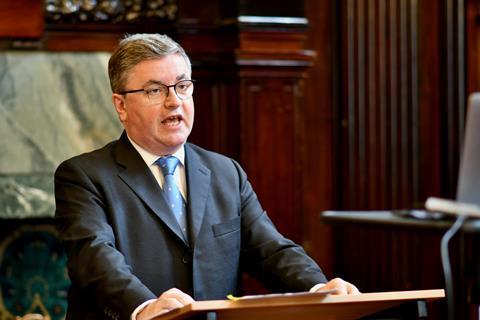New corporate 'failure to prevent' offences are likely to be added to the government's latest economic crime legislation as it passes through parliament, a former lord chancellor predicted this morning. Sir Robert Buckland KC MP, now secretary of state for Wales, told a conference in London that amendments could strengthen the measure beyond the recommendations of this year's Law Commission report.
The Economic Crime and Corporate Transparency Bill begins its second reading in the House of Commons on Thursday. The measure would reform Companies House and create new powers to compel businesses to hand over information which could be related to money laundering or terrorist financing. However Buckland, sitting on a panel in a London conference organised by the American Bar Association's criminal justice section, suggested that parliament may wish to add further teeth.
'What isn't in the bill is as interesting as what is,' he said. 'I hope not to prejudice the government's position, but amendments [to create an offence of] failure to prevent economic crime... could be quite a dramatic move by parliament.'

He said he did not know where such amendments would come from, but hinted that they would reflect the government's 'direction of travel'. Buckland noted that, in a wide ranging review of corporate criminal liability published in June the Law Commission gave 'a very clear flavour of where UK policy makers are going'. That review proposed making corporate prosecutions easier by removing the need to identify a 'directing mind and will'.
Earlier, Max Hill, director of public prosecutions, told the conference that the CPS supported a review of corprate criminal liability laws. 'Extending the "failure to prevent" principle and reform of the identification principle could help to address some of the challenges we face under the current law,' he said.
Hill also called for more involvement of the defence in tackling the 'digital explosion' of discovery material - amounting to 32 million files in one recent case. 'That is why early engagement between investigators and prosecutors is vital,' he said. 'But I would argue that equally important is early engagement with the defence.' Thus establishing 'reasonable lines of inquiry' would narrow the volume of material to be handled.
Meanwhile Hill brushed aside suggestions from the floor that the Serious Fraud Office should be merged with the CPS. He noted that the SFO is both an investigator and a prosecutor and contrasted its focus on a handful of very high value probes with the CPS's caseload of 400,000 a year. 'Do I look at the SFO with envy and wish I was taking on these cases? No!,' he said, 'we're happy with our non-investigative, non-directive role.'



























6 Readers' comments